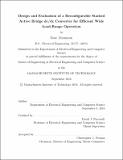Design and evaluation of a reconfigurable stacked active Bridge dc/dc converter for efficient wide load-range operation
Author(s)
Abramson, Rose (Rose A.)
DownloadFull printable version (78.99Mb)
Other Contributors
Massachusetts Institute of Technology. Department of Electrical Engineering and Computer Science.
Advisor
David J. Perreault.
Terms of use
Metadata
Show full item recordAbstract
This thesis presents the design and implementation of a step-down soft-switched dc-dc converter based on an active bridge topology which overcomes some of the limitations of the conventional dual-active bridge (DAB). The topology comprises a double-stacked bridge inverter, coupled to a recongurable rectifier through a special three-winding leakage transformer. The converter can run in a low power mode that greatly increases light-load efficiency by reducing core loss and extending the zero-voltage switching (ZVS) range. The converter is implemented with a single compact magnetic component, providing power combining, isolation, and energy transfer inductance. The theory of the converter and its various operating modes, referred to in this thesis as the Double-Stacked Active Bridge converter, is also explored, and a magnetic model of the special three-winding transformer and leakage inductance is presented. The target application is for 380 V dc distribution systems for data centers, where the converter operates for the majority of the time at the nominal input voltage, but must have high eciency over a wide load range. A 175 kHz, 300 W, 380 V to 12 V prototype converter achieves 95.9% efficiency at full load, a peak efficiency of 97.0%, an efficiency above 92.7% down to 10% load and an efficiency above 79.8% down to 3.3% load.
Description
Thesis: M. Eng., Massachusetts Institute of Technology, Department of Electrical Engineering and Computer Science, 2016. This electronic version was submitted by the student author. The certified thesis is available in the Institute Archives and Special Collections. Cataloged from student-submitted PDF version of thesis. Includes bibliographical references (pages 277-279).
Date issued
2016Department
Massachusetts Institute of Technology. Department of Electrical Engineering and Computer SciencePublisher
Massachusetts Institute of Technology
Keywords
Electrical Engineering and Computer Science.